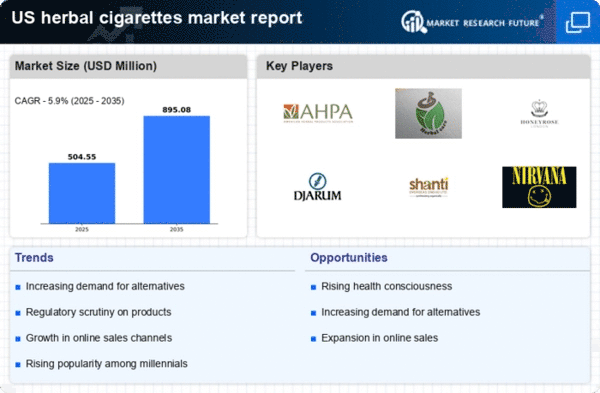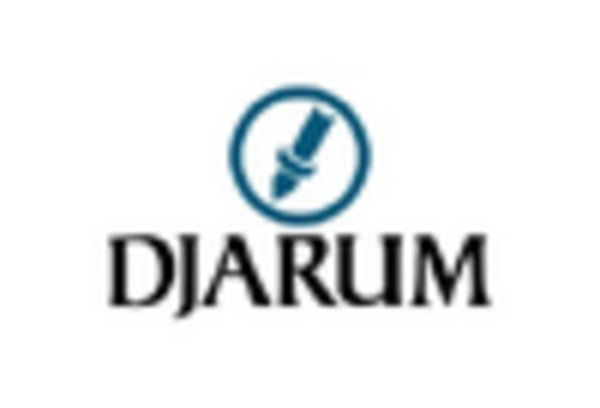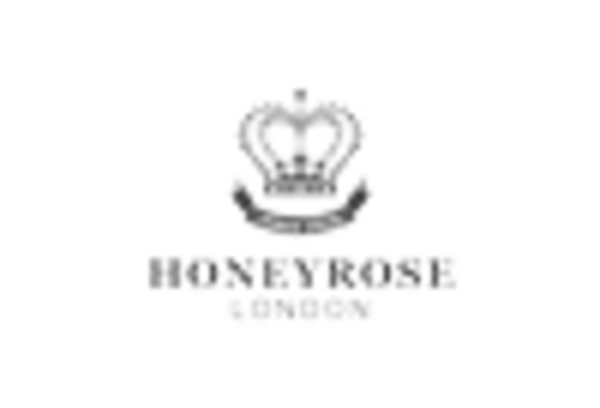Influence of Lifestyle Changes
Lifestyle changes among consumers are significantly impacting the herbal cigarettes market. As more individuals adopt healthier lifestyles, there is a corresponding shift towards products that reflect these values. The herbal cigarettes market is likely to benefit from this trend, as consumers increasingly seek out products that are perceived as natural and less harmful. This shift is evident in the growing popularity of herbal cigarettes among younger demographics, who are more inclined to experiment with alternative smoking options. The herbal cigarettes market is thus poised for growth, as lifestyle changes continue to drive consumer behavior towards herbal alternatives, potentially increasing market share and expanding the customer base.
Increased Availability of Herbal Products
The herbal cigarettes market is witnessing an increase in the availability of various herbal products, which is likely to enhance consumer access and choice. Retailers are expanding their offerings to include a wider range of herbal cigarette brands and flavors, catering to diverse consumer preferences. This expansion is supported by the rise of online retail platforms, which provide consumers with convenient access to herbal cigarettes. As a result, the market is expected to grow, with estimates suggesting a potential increase in market size by 20% over the next five years. The herbal cigarettes market is thus benefiting from improved distribution channels, making it easier for consumers to find and purchase herbal options.
Rising Demand for Alternative Smoking Products
The herbal cigarettes market is experiencing a notable increase in demand as consumers seek alternatives to traditional tobacco products. This shift is largely driven by a growing awareness of health risks associated with smoking tobacco. According to recent data, the herbal cigarettes market has seen a growth rate of approximately 15% annually in the US. Consumers are increasingly attracted to herbal cigarettes due to their perceived lower health risks and the absence of nicotine. This trend indicates a significant transformation in consumer preferences, as individuals prioritize wellness and seek products that align with a healthier lifestyle. The herbal cigarettes market is thus positioned to benefit from this rising demand, as more individuals turn to herbal options for their smoking needs.
Impact of Social Media and Influencer Marketing
The herbal cigarettes market is being shaped by the impact of social media and influencer marketing, which play a crucial role in shaping consumer perceptions and preferences. Influencers promoting herbal cigarettes as a healthier alternative to traditional smoking are likely to attract a younger audience. This marketing strategy appears to resonate well with consumers who are influenced by social media trends. As a result, the herbal cigarettes market is expected to see increased visibility and brand awareness, potentially leading to higher sales. The effectiveness of social media campaigns in reaching target demographics suggests that this trend could significantly enhance the market's growth trajectory in the coming years.
Growing Interest in Organic and Natural Products
The herbal cigarettes market is increasingly influenced by the growing interest in organic and natural products among consumers. This trend is reflected in the rising demand for products that are free from synthetic additives and chemicals. As consumers become more health-conscious, they are gravitating towards herbal cigarettes that emphasize natural ingredients. This shift is likely to drive innovation within the herbal cigarettes market, as manufacturers respond to consumer preferences by developing new products that align with these values. The market could see a significant increase in sales as more consumers opt for herbal cigarettes that are marketed as organic or natural, potentially leading to a more robust market presence.

















